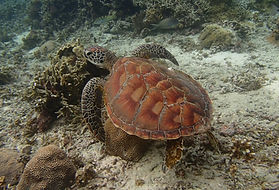
Ocean view rentals in Ishigaki island
ISHIGAKI WILDLIFE
AQUATIC SPECIES & TROPICAL FISH
INTRODUCTION
Tropical fish you may see when snorkeling in Ishigaki
※Parrotfish
Japanese name: ブダイ・イラブチャー


※ Bluelined surgeonfish
Japanese name: ニジハギ
_JPG.jpg)
※ Blue damselfish (or blue demoiselle)
Japanese name: ルリスズメダイ


※ Tomato clown fish
Japanese name: ハマクマノミ

※ Lionfish (Pterois)
Japanese name: カサゴ

※Four stripe damselfish (Whitetail dascyllus)
Japanese name: (リュウキュウスズメダイ)

※ Banded sea krait (sea snake)
Japanese name: (エラブウミヘビ)

※ Scribbled Rabbitfish
Japanese name: ヒメアイゴ


※ Japanese halfbeak
Japanese name: オキザヨリ・サヨリ

※ Butterflyfish
Japanese name: チョウチョウウオ



.jpg)
※ Lagoon triggerfish
Japanese name: ムラサメモンガラ

※ Moorish idol
Japanese name: ツノダシ


※ Anemonefish (nemo/clownfish)
Japanese name: カクレクマノミ


※ Titan triggerfish
Japanese name: (ゴマモンガラ)

※ Six-banded sergeant-major
Japanese name: ロクセンスズメダイ

※Trumpetfish
Japanese name: ヘラヤガラ

※ Convict surgeonfish
Japanese name: シマハギ


※ White-spotted pufferfish (fugu)
Japanese name: サザナミフグ

※ Blotched foxface (Rabbitfish familly)
Japanese name: (ヒフキアイゴ)

_JPG.jpg)
※ Sixbar wrasse
Japanese name: セナスジベラ

※ Sea turtle (marine reptile)
In Japanese: ウミガメ


※ Sea cucumber (echinoderm)
Japanese name: ナマコ
(Picture: Black sea cucumber)

※ Hermit crab (crustacean)
In Japanese: ヤドカリ
(Picture: Land hermit crab)








